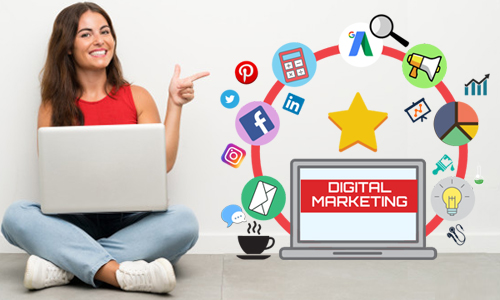Why Media Buying is Important For Your Business
Business FreelancingPosted by admin on 2023-07-04 15:17:54 | | عربي
Share: Facebook | Twitter | Whatsapp | Linkedin Visits: 71

Media buying is a process used in paid marketing efforts. Its objective is to identify and purchase advertising space on channels relevant to the target audience at the optimal time and with the least amount of money, through social media and search engines. And when done effectively, Media Buying freelancers achieve a high percentage of their target market with minimal outlay.
What are the platforms through which Media Buying works:
The Media Buyer's work is divided into two different platforms, which are social media platforms and search engines. It is very important that you choose the right platform that your target audience frequents and that can help you reach your campaign goals. Some of the most popular platforms are as follows:
1- Advertisements on social media
Almost everyone is on social media and it is easy to reach the target audience since each social media platform has specific characteristics for its users such as (Facebook, Instagram, Twitter, Linkedin, Snapchat, etc..).
There are four main components of social media advertising that every Media Buyer cares about:
- Campaign objective:
What are you trying to achieve with the campaign?
a. Brand awareness
B. Increase social media following
c. Increase sales of Product X
D. Drive traffic to the website
e. Drive store visits
The e-marketer sets these goals because they will allow you to measure the right metrics and calculate the return on investment for the campaign.
- The target audience:
An online marketer works to be as specific as possible when it comes to choosing your target audience so that your audience understands what type of content they are most receptive to.
- Campaign designs:
Campaign creatives are ad copy (messages) and visuals (photos, gifs, and videos). Campaign creatives should be prepared keeping in mind the target audience and platform guidelines.
Campaign budget and success measures:
It includes the money that you will actually pay to run the advertising campaign, and it must be carefully determined in order to get the highest return from it, and it is one of the most important roles of the Media Buyer.
2- Google Ads / SEM ads
Since Google is the most traded site on the Internet, making ads through it is one of the profitable things for any project.
SEM stands for Search Engine Marketing. Which is completely different from SEO, "search engine development", and we will define the difference between them through the following points:
What is the difference between search engine optimization (SEO) and search engine marketing (SEM)?
Both SEO and SEM rely heavily on keywords to drive traffic to websites and business web pages. Although the marketing techniques used for each are different, they focus on traffic flows and how they relate to marketing activities. People will use search engines to search for something they are looking for, and they will be able to find it through organic results (SEO) or paid results (SEM).
Most people search online before buying anything, so having a strong search presence is crucial and using a strategic combination of the two can boost your visibility in the long run.
SEO is for organic or unpaid traffic, and SEM is for targeted ads that you pay for.
If your website is new, you can prioritize your PPC campaign first or SEM campaigns as it may take some time for your SEO rankings to build up, but don't ignore your SEO during the process.
SEO is the practice of continuous optimization of a website in order to rank in organic unpaid search engine results pages (SERPs). SEO can be divided into three main sub-categories:
On-page SEO:
This is where you optimize your website around the keywords your target customer is searching for in Google, Bing, and other search engines. For example, one of the best practices for on-page SEO is to include your main keyword in the title tag, meta description, and URL of the web page.
Off-page SEO:
Off-page SEO is all about getting signals of trust and authority from other websites. Basically this involves building quality backlinks to your site. But Google may also use other off-page signals to increase your site's authority.
Technical SEO:
This is where you can ensure that Google and other search engines can crawl and index all of the pages on your website. Technical SEO also includes things like making sure your pages load quickly. and that your site structure is set up correctly.
Search
Categories
Recent News
- As an employer: How can I transfer money to freelancing sites?
- 6 Reasons You’re Not Getting Any Work On Freelance Sites
- 6 skills you must learn in 2023 as a freelancer
- 7 Productivity Tricks For Working As a Freelancer
- How To Be an Exceptional Freelancer
- الأخطاء التي يجب تجنبها إذا كنت تريد أن تكون فري لانسر ناجحًا
- How To Measure Your Business Growth
- How To Measure Your Business Growth
Popular News
- How to get the best projects on freelancing platforms
- As an employer: How can I transfer money to freelancing sites?
- 7 tools that help you as Freelancer to work remotely from home successfully
- How to Write a Mission Description that Attracts Freelancers
- 5 important tips for new entrepreneurs in 2023